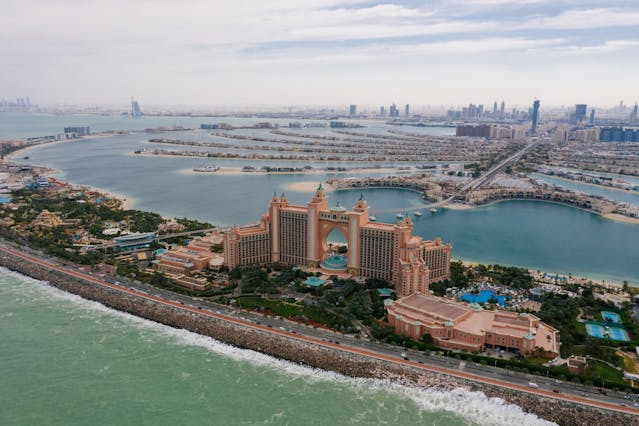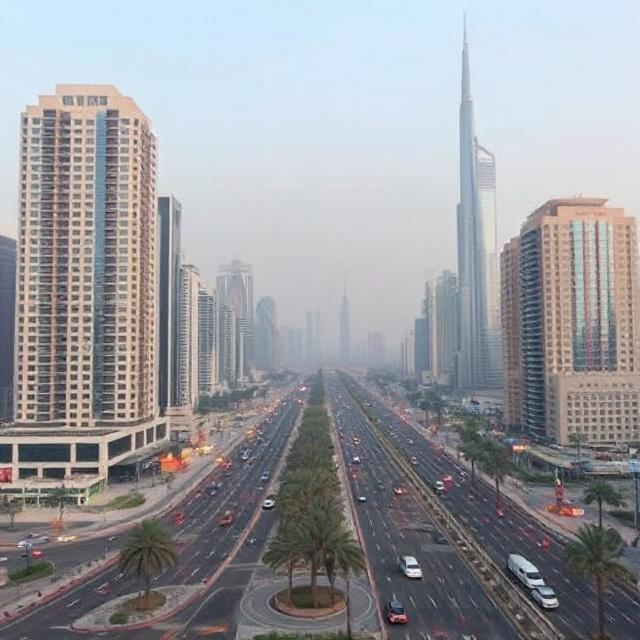Dubai, a city known for its towering skyscrapers and luxurious lifestyle, has been grappling with an issue that’s not as glamorous – air quality.
Many expats and locals alike often find themselves asking, “Why is Dubai’s air quality so bad?”
This article aims to shed light on this pressing issue, exploring the causes, impacts, and potential solutions to Dubai’s air pollution problem.

Understanding Air Quality
Air quality is a measure of how clean or polluted the air in our environment is. It’s determined by assessing the concentrations of various pollutants, including particulate matter (PM2.5 and PM10), nitrogen dioxide, sulfur dioxide, carbon monoxide, and ozone.
Good air quality is essential for maintaining our health and the health of the environment. Exposure to poor air quality can lead to a range of health issues, from minor irritations like coughing and throat irritation to serious conditions like heart disease and lung cancer.
The State of Air Quality in Dubai
Dubai’s air quality often fluctuates, largely due to its unique geographical location and rapid urban development.
The city’s air quality index (AQI), a standard measurement used worldwide to assess air pollution levels, often exceeds the guidelines set by the World Health Organization (WHO). These guidelines are designed to protect public health from the harmful effects of air pollution.
In Dubai, the AQI can vary significantly throughout the year. During the summer months, when temperatures can soar above 40 degrees Celsius, the AQI often spikes due to increased dust and sand in the air. Conversely, during the winter months, the AQI tends to be lower, although still above WHO guidelines.
The WHO guidelines recommend that the annual mean levels of PM2.5 (fine particulate matter) should not exceed 10 µg/m3 and PM10 (coarse particulate matter) should not exceed 20 µg/m3.
However, studies have shown that Dubai’s annual mean levels of PM2.5 and PM10 often exceed these guidelines, posing potential health risks to residents and visitors.
Causes of Poor Air Quality in Dubai
Dubai’s air quality is influenced by a combination of natural and man-made factors.
1. Natural Factors
Dubai’s geographical location and desert climate play a significant role in its air quality. The city is often subjected to dust and sandstorms, especially during the summer months.
These storms can significantly increase the levels of particulate matter in the air, contributing to poor air quality.
2. Fossil Fuel Production
As part of the UAE, Dubai is a major player in the global oil industry. While the city itself is not a major oil producer, it is affected by the emissions from oil and gas production in the region.
These emissions can contribute to higher levels of pollutants like sulfur dioxide and nitrogen oxides in the air.
3. Industrial Activities and Vehicular Emissions
Dubai’s rapid urbanization and industrial growth have also contributed to its air pollution problem.
Emissions from vehicles, construction activities, and various industries release a significant amount of pollutants into the air. Despite efforts to regulate and reduce these emissions, they continue to impact Dubai’s air quality.
Read: What is Pending Credit in NOL Card?
Impact of Poor Air Quality
Poor air quality has both health and environmental implications.
1. Health Risks
Exposure to poor air quality can lead to a range of health issues. Short-term effects can include coughing, throat irritation, and shortness of breath.
Long-term exposure can lead to more serious conditions like heart disease, lung cancer, and respiratory diseases such as asthma. Vulnerable groups, including children, the elderly, and those with pre-existing health conditions, are particularly at risk.
2. Environmental Implications
Air pollution doesn’t just affect human health – it also has significant environmental impacts. It can harm wildlife, damage plants, and degrade the quality of water bodies.
Furthermore, many air pollutants contribute to climate change, which can have far-reaching effects on the environment and biodiversity.
Measures to Improve Air Quality in Dubai
1. Government Initiatives
The UAE government has been proactive in addressing the issue of air pollution. Several initiatives have been launched to monitor and improve air quality.
For instance, the UAE’s Ministry of Climate Change and Environment has implemented strict emission standards for industries and vehicles. They have also invested in renewable energy sources, such as solar and wind power, to reduce reliance on fossil fuels.
2. Individual Contributions
While government initiatives are crucial, individual actions also play a significant role in improving air quality.
Simple steps like reducing car usage, recycling, and conserving energy can make a big difference. Public awareness campaigns are also essential to educate people about the importance of these actions and their impact on air quality.
Read: What is PO Box Number in Dubai?
Conclusion
Dubai’s air quality is a complex issue, influenced by a variety of factors ranging from its desert climate to rapid urbanization and industrial growth.
While the city faces significant challenges in managing air quality, efforts are underway to address this problem. Both government initiatives and individual actions play a crucial role in this endeavor.
As we continue to understand and tackle the causes of air pollution, we can hope for a future where the air in Dubai is as clear as its vision for progress.
